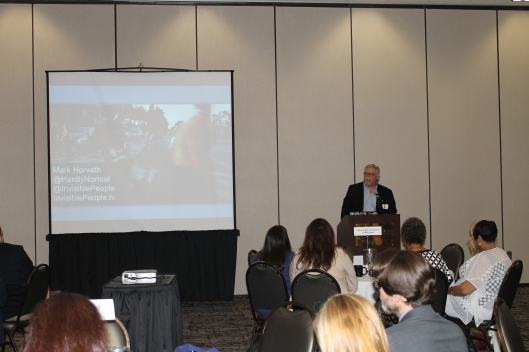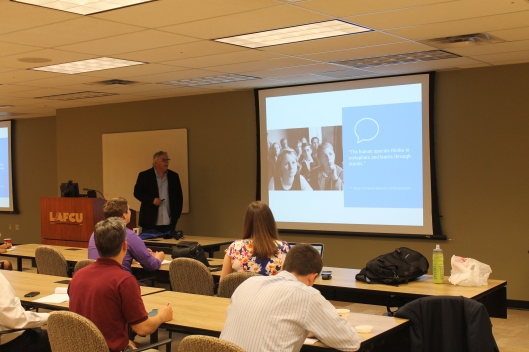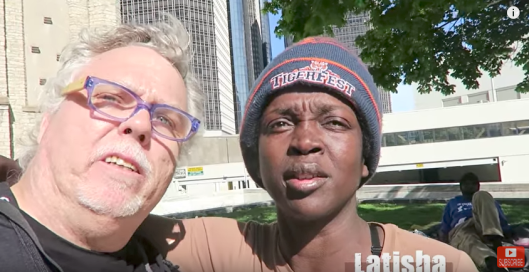Tags
Breakfast of Champions, Detroit, digital storytelling, homelessness, Invisible People, Michigan, personal stories, smart phone, social media, storytelling, video blog, workshop
Nick Kipper is the new Communications and Public Policy intern at MCAH. In his first week, he attended the Breakfast of Champions and digital storytelling workshop with Mark Horvath and walked away with a new appreciation for how to share the stories of those experiencing homelessness.
“Homelessness isn’t sexy unless it’s Thanksgiving.”

Mark’s speech at MCAH’s Breakfast of Champions
As an intern experiencing my first week working for a nonprofit like MCAH, I was taken aback by Mark Horvath’s words while speaking at the Breakfast of Champions. Turning the other cheek or simply walking past someone experiencing homelessness without acknowledging them is something we have all been guilty of at some point in time. As Mark spoke further about his own experiences with homelessness, the name behind his video blog Invisible People really began to sink in. These people are often ignored, left to fend for themselves with little to no recognition from the general public. Just from Mark’s 30-minute speech, I could see the voice he has given this at-risk population and the power of his digital platform.
Mark’s digital storytelling workshop following breakfast combined both marketing and journalism into one. As an ex-marketing major and current journalism student, I was able to observe the two working hand in hand for a common goal. Using video to tell the stories of those affected by homelessness, Mark is able to appeal to basic human emotions and bring their struggles to light. By then posting these videos to various social media platforms, the stories are able to reach a mass audience. These overlooked people are suddenly broadcasted on thousands of screens, reaching those who otherwise would have no idea of their daily fight for recognition.
Mark also had some very tangible lessons for us during his workshop. “Authenticity has replaced production value,” he said. You can have the most expensive equipment in the world, but if it doesn’t resonate with your audience then it is rendered basically useless. Invisible People’s second most viewed video was taken on the streets of London, using only the video and audio from a smartphone. The interaction with this young woman is the perfect example of authenticity transcending production quality.
Mark went on to speak of the changing digital landscape and the emergence of lone storytellers using their smartphones to outperform some of the largest organizations with extensive communications budgets. He also warned against making advertisements focusing solely on the organization. People want to see the process of someone overcoming obstacles, highlighting the human aspects of the good a nonprofit can contribute. This includes telling the not-so-great parts of the story and making the message you are trying to convey realistic as well as authentic.
As someone new to understanding issues around homelessness, I was able to witness the questions and concerns many of the participants had with fresh eyes. I could see their focus shift to how to apply Mark’s concepts to their own organization. A common topic amongst the group was how to tell stories without taking advantage of the individual. Mark advised that there should be consent from the participant being filmed, and the need to be upfront and honest about the project. Being forthright establishes trust, which can lead to more authentic storytelling. What struck me most from the discussion was the genuine care the people at the workshop expressed. While furthering their cause and increasing donations is important, they wanted to make sure they knew the proper way to go about approaching someone without necessarily using the story for their own personal gain.

Mark’s digital storytelling workshop
All in all, Mark’s speech and workshop opened my eyes to the potential of effective digital storytelling. Taking many of the aspects of citizen journalism and then applying it to the realm of social media can extend the reach of your message to a widespread audience. A heartfelt story can go a long way to bringing awareness and empathy that your typical advertisement cannot. Armed with a smart phone, anyone has the ability to tell an effective story with the right intentions in mind. Bringing a voice to the voiceless is something Mark does on a daily basis. Having the opportunity to watch these people actively participate in the workshop demonstrated the drive so many nonprofits have, not only to further their cause but to bring a story to life the public otherwise would not see.
If you are interested in supporting Invisible People and helping to end homelessness please consider donating here.
By Nick Kipper, Communications & Public Policy Intern at Michigan Coalition Against Homelessness. You can contact him at: commintern@mihomeless.org


Thank you for this write up! I now wish I had attended the breakfast and storytelling workshop as this is just the kind of advocacy I hope to see more of here in Detroit.
Pingback: MCAH’s Year in Review and Eyes Ahead for 2018! | Michigan Coalition Against Homelessness